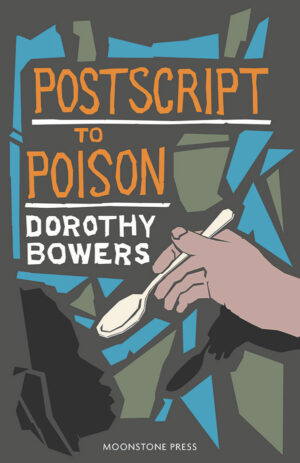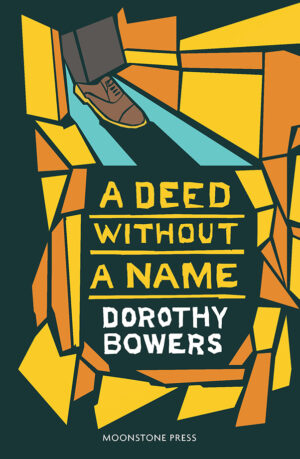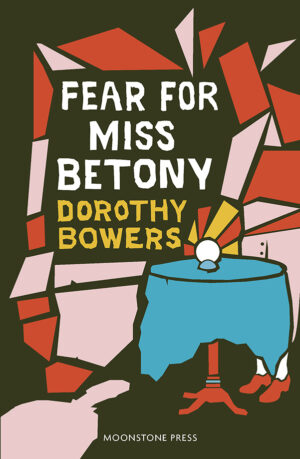The Bells At Old Bailey
It was not until the fifth death in Long Greeting that Miss Tidy made up her mind to go to the police.
It was not a sense of civic duty that compelled her, but the arrival of two letters that made it clear her life was in danger. The local villagers had been agitated for months over whether the seemingly unconnected deaths were the suicides they appeared to be. Better to say nothing of her intentions though, not even to her immediate circle: the staff of the Minerva hat shop who worked for her, or Léonie, her old Breton maid. Nor would she mention the letters to her interested neighbours or the rector, who had buried four of the victims, or even to Owen Greatorex, the novelist of international reputation, who seemed disarmingly gentle. For who was to be trusted?
Scotland Yard is soon on the scene but more deaths occur before Detective-Inspector Raikes puts the pieces together.
Dorothy Bowers (1902–48) was a champion of “fair play” mysteries, in which all the clues are cunningly displayed within the story. The Bells at Old Bailey (1947). was her fifth and last novel. Bowers died in 1948 from tuberculosis, having been inducted the prestigious Detection Club a few months earlier.
£9.99
By Dorothy Bowers
First published in 1947 by Hodder & Stoughton
Paperback
285pp
ISBN 9781899000111
Interesting Links: A review of The Bells At Old Bailey by William F. Deeck at Mystery*File
2 reviews for The Bells At Old Bailey
Only logged in customers who have purchased this product may leave a review.
It was not until the fifth death in Long Greeting that Miss Tidy made up her mind to go to the police. And then from no sense of civic duty but because she knew her own security imperilled.
For a woman of uncommon resolution she had been slow to reach a decision; having come to it, however, there would be no turning back.
She would say nothing of her intention to the staff of the Minerva. Business was in a delicate enough condition. All this unhealthy babble spinning about murder versus suicide hypotheses was entirely alien to the chaste atmosphere she had for years cultivated for the creation and proper disposal of hats. So she had refused to subscribe to the prevailing hysteria by the very smallest show of interest in the more dubious manifestations of local activity. At first she had tried by the silent disapproval that rarely missed its target to discourage even discussion of the emphatically publicized inquests. When this failed she went on ignoring the furtive gossip, the whispered fears, the cumulative suggestiveness harboured by panicky women that rippled slyly out of the hatshop into the no less exclusive café behind, and thence gushed full course in the beauty parlour, her last and most profitable addition to the establishment.
There, it was only to be expected, tattle ran boldly and unstemmed. The passivity demanded for a reconditioned skin or the right sort of eyebrow was a notorious tongue-loosener, so that even clients who in ordinary social intercourse practised a measure of reserve found themselves in those cribbed, attractive cubicles receiving and imparting the most astonishing confidences. Miss Tidy made no real effort to check them there; she knew defeat when she met it. Besides, such slips of the tongue as occurred had at times been not unuseful to her.
But it was on these accounts, as well as for a more cogent private reason, that she herself preserved uncompromising reticence. Now that she was going to break it, it should be in the official sense only.
Business over for the day, she was giving a good deal of reflection to these things as she watched the staff departures before locking up.
There were only four of them now. She managed the beauty parlour alone these days. Marion and Jane from the teashop were always the first to go: Marion on foot because she had only to cross the cathedral close to Thistle Street where she lived with her old aunts, and Jane to get the bus for Stoneacre hamlet, the next stop after Long Greeting. Miss Tidy never used the bus. Season in, season out, she clung obstinately to the belief that health was best maintained by the something-under-three-miles cycle ride between Ravenchurch and her cottage in Long Greeting. The bus too would have entailed constant travel in Jane’s company, mutually embarrassing at both ends of a day spent in common harness.
From the half-open café window that looked on Flute Lane she could see the two she mentally dubbed “Hats” pulling their bicycles out of the alley behind the antiquarian bookshop opposite. Samela was the first to disentangle, her small, dark, exquisite features as guarded as if she had not doffed the saleswoman for today. Conscious of scrutiny, perhaps, she raised her eyes and looked straight into Miss Tidy’s, smiling at once with the impersonal courtesy that might have expected to find her there. More than that; she made, Miss Tidy was sure, a delicate signal of sorts to Crystal Bates, who, emerging from the alley, was just moving her lips for an utterance doomed at birth. For she closed them again with such deliberation and directed so swift a stare at the teashop that Miss Tidy, with a wintry smile of acknowledgement, decided that the girl came as near to looking silly as such loveliness could ever look.
She watched them move one behind the other down the narrow lane from which medieval builders had almost expelled the light, a brilliant shaft of sunshine firing Crystal’s Titian hair. They were both married women, and both, in her opinion, complete irresponsibles.
All the same she would have liked to hear whatever it was that Samela Wild had stopped Crystal saying.
The Minerva was uncannily quiet with everyone gone. Miss Tidy approved it so. Closing windows and unnecessarily visiting rooms already in order, she was able in solitude to review her resources and congratulate herself again for having created this business out of nothing and made it the sparkling factor it was in Ravenchurch society. Hats… tea… complexions. She alone had gauged for women what a formidable triple alliance they made.
Her mind, always alert, was more than usually so this evening. It was partly the summer, of course, a memorable one this year; the morning-to-night June radiance, while physically tiring, stimulated all her mental faculties. She had remarked before this peculiarly gratifying compensation for torrid weather; bodily exhaustion was offset by a greater clarity of mind and will.
It was good, she thought with a touch of complacency, to know that neither time, responsibility, nor the well-mannered hostility of Ravenchurch had yet impaired her quality or the precision of her judgements. Three days from now she would be sixty years old, yet she knew unquestionably that her brain today was a more acute organ than ever it had been thirty years earlier. The knowledge filled her with gloating, for she could not recall a time when there had been as now such constant demand upon all the acumen she possessed.
Only two objects decorated the cream-washed, timbered walls. One of them, in a crooked oak frame, was a large canvas sampler worked in coloured wools, not uncommonly old but distinguished by a purely secular sentiment. Miss Tidy had forgotten why she had put it there—simply to fill a space, she supposed—but she went on keeping it because people coveted it and it was nice to have the power to withhold their desire. The other was a Sheraton mirror, simple, graceful, a bit spotty, and wholly unpredictable at the angle at which it hung. When it wasn’t catching useful vignettes of social life in Flute Lane, it would intercept between a couple of café patrons an eloquent glance or two seldom lost on Miss Tidy, or else it would betray Marion’s fatigue and hint at how much more boredom Jane was likely to put up with.
Now it shot back at Miss Tidy the glittering whiteness of her carefully dressed hair. She viewed herself with the detachment other people found repellent. A time there had been when her pocket-Venus proportions were a source of annoyance to her; like other small women of extravagant ambition, she had in youth cherished yearnings after a Brünnhilde stature, but now, examining scrupulously her meagre inches from snowy crown and full blue eyes to the arches of her tiny feet, she felt they might well be an asset. Little people suggested a defencelessness rarely in fact theirs; and this was all to the good in view of her approach to the sceptical police.
Yes, all her perceptions were sharpened to a fine point. They made her aware of a number of things at once: of the shadow of Mrs. Emmie Weaver swooping among her books at shutting-up time on the other side of Flute Lane, of the possible significance of Crystal’s unspoken remark, of the empty room in front where hats were dispensed and the equally empty kitchen behind, of the absence of any reassuring footfall in the cubicles upstairs, of two letters at the moment bulging disagreeably the inner pocket of her handbag, of a large and faceless Fear groping for her among the deserted tea tables.
The air had lost its golden warmth. She shivered and, going to the door that gave onto the lane, shot its bolts sharply. At this concession the Fear loomed up in titanic form…
“You fool,” Miss Tidy addressed herself with ferocity.
She went over to the sampler and touched with an unsteady finger the first lines of “The Bells of London,” Worked by Adelaide Bascombe Aged Eight in the Year of Our Lord 1842:
“Gay go up—and gay go down…”
If recklessness were gaiety—well, the Minerva had been founded on it.
“And if you do go down, as your delightful correspondents would like you to do,” Miss Tidy whispered grimly, “let it be in the same spirit, my dear… But—you’re not—going to!”





Editor –
Review from The New York Times, December 14, 1947:
“Skillfully plotted against an authentic English background….[the story] proves that a whodunit can be a literate and entertaining excursion into murder”
Editor –
Review from The Sunday Times, November 30, 1947 by Laurence Meynell
“A really good detective story. Five suicides (or murders?) in one village may seem a little extravagant; but Detective-Superintendent Raides goes about the business unvravelling the tangle with more than competence. This is good writing, with the telling, character-revealing phrase skilfully used. Readers who prefer the detective story pure and simple should make a note of this one.”